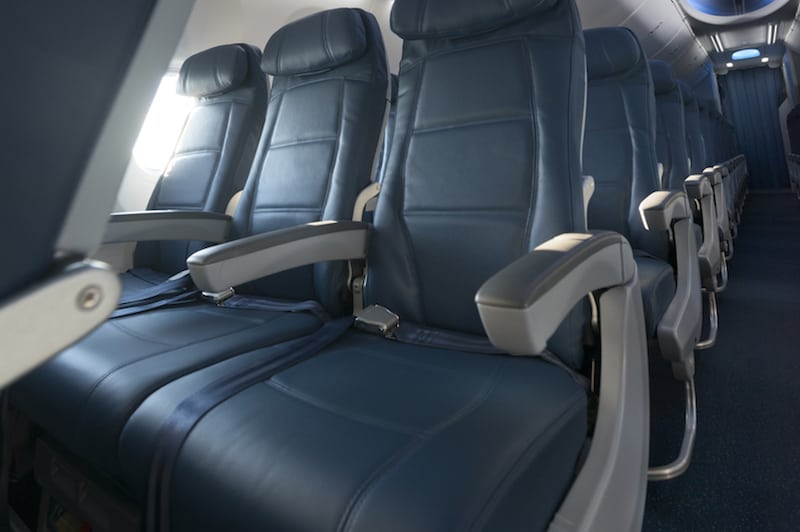Delta to Expand Basic Economy Fares That Generated $20 Million in Extra Revenue

Skift Take
Delta reported today that its new Basic Economy fares, which offer lower prices, no ticket changes, and seat assignments only after check-in, generated $20 million in incremental revenue in the first quarter, and the airline plans to expand the service to new U.S. markets.
The Basic Economy fares, geared for passengers who care mostly about price and as a hedge against no-frills carriers such as Spirit Airlines and Frontier Airlines, currently only appear in about 4,000-5,000 of Delta's 20,000 domestic markets.
But Glen Hauenstein, who becomes Delta president May 2, said today during the airline's first quarter earnings call that the rollout will soon be expanded.
For critics who thought that Basic Economy would be counterproductive for Delta in that it would be purchased by passengers who otherwise would have purchased higher fares, Delta is saying that didn't happen -- or if it did the Basic Economy fares still kicked in $20 million of incremental revenue.
"You know Basic Economy is really designed for customers who solely are purchasing on price and I think our value proposition relative to the ultra low cost carriers is very, very strong," Hauenstein said. "We have great customers, great operational reliability, great baggage delivery and we already have a lot of things that on other ultra low cost carriers are not free like. We don't charge for space in overhead bins.
"So if you're stopping for just solely price we want to have a product that can compete effectively and provide the best services against carriers who are providing a much lower quality of service. And I think that's what this is designed for."
Hauenstein said Delta's plan "over the next weeks and months" will be to continue to introduce Basic Economy in new domestic markets. "So we do have a great value proposition for people who are just looking for lowest possible fare," he said.
Asked whether that $20 million of incremental revenue might be a high-water mark for Delta Basic Economy fares if United and American airlines debut their own basic economy fares, Ed Bastian, who becomes Delta CEO May 2, said: "I don’t think that’s the case... But I think it might be the opposite."
On the pricing front, today a Basic Economy fare for a Seattle-Atlanta roundtrip on March 17-19 on Delta.com was selling for $422 compared with $467 for Main Cabin, $545 for Delta Comfort and $901 for First class fares.
These Basic Economy fares offer only limited benefits for Delta Medallion members, who must fly 25,000 qualifying miles or 30 qualifying segments and spend $3,000 to reach the lowest tier, Silver. As a deterrent to Medallion members buying Basic Economy fares, they aren't eligible for paid or complimentary upgrades to first class, Preferred Seats or Delta Comfort.
Alaska Airlines, Virgin America, and JetBlue
Asked during their first quarter earnings call April 14 how the Alaska Airlines-Virgin America merger, and JetBlue's expansion of its Mint service into Seattle might impact Delta, Bastian declined to comment on the merger but said Delta had already planned on expanding flights with lie-flat seats from New York to Seattle.
Bastian said the airline will "continue to grow" in Seattle. "We had a very good margin in the first quarter and I think our outlook is strong there. We're not going to comment on proposed transaction. We'll react when we see what happens in the marketplace.
"On the Mint product between Seattle and JFK and Boston, we currently have flatbeds on a single flight between our two flights between New York and Seattle," Bastian said. "We had already in the plans to make sure that we had a consistent product in terms of flatbeds seats in key time channels between the two markets. That's not all time channels, but on the redeye, certainly we will have flatbed product in Seattle to New York."
Gulf Carriers and Open Skies
The issue of revisions to Open Skies agreements and the three Gulf carriers allegedly competing unfairly by taking large government subsidies is still very much in play, as Delta sees it, despite the fact that it has vanished from the headlines in recent months and one of its most prominent personalities, Delta CEO Richard Anderson, is leaving the industry.
Delta has reason to believe that the U.S. government "will do the right thing," said CFO Paul Jacobson, who added that such action will "take some time."
Delta, United, and American have been calling on the U.S. government to negotiate with the Gulf carriers or alter facilitate the revision of Open Skies agreements to shield these U.S. airlines from what they see as unfair competition.
Much of the U.S. travel industry, including the U.S. Travel Association, however, believes that such changes to Open Skies are not necessary.





